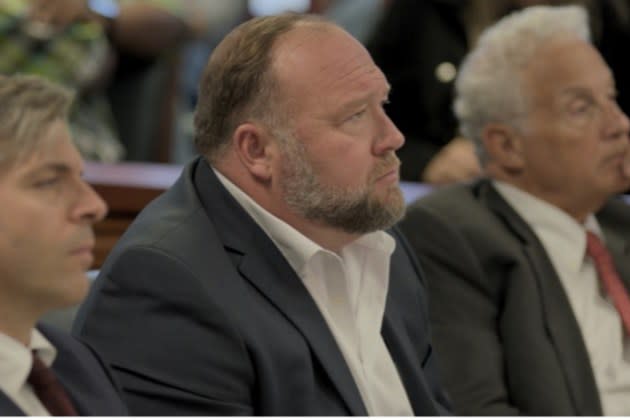Why Dan Reed Wanted to Do a Doc on Alex Jones and Sandy Hook: ‘We Are Sleepwalking Into This Era of Fantasy and Lies Becoming Mainstream’
- Oops!Something went wrong.Please try again later.
- Oops!Something went wrong.Please try again later.
- Oops!Something went wrong.Please try again later.

British director Dan Reed (“Leaving Neverland”) spent four years filming Sandy Hook Elementary parents as they attempt to hold Alex Jones — the infamous talk-news conspiracist guru of InfoWars — accountable for the lies he spread about their children’s murders in 2012. The result is the HBO documentary “The Truth vs. Alex Jones.”
Bringing Jones to trial involved years of effort by the grieving parents and their legal teams and culminated in two jury trials for damages in Texas and Connecticut. The outcome was America’s biggest-ever defamation verdict, with nearly $1.5 billion awarded by juries in the two states to the families, Not surprisingly Jones, who called the Sandy Hook massacre a hoax and was accused of using the tragedy to help sell dietary supplement on his site, subsequently declared bankruptcy.
More from Variety
Variety spoke to Reed ahead of “The Truth vs. Alex Jones” SXSW world premiere on March 11.
What made you want to tell this story?
I was fascinated by disinformation and the way lies gain a foothold and currency, particularly lies about bad things happening to children. A lot of conspiracy theories, nefarious fables and disinformation involves groups who are minorities and groups who are stigmatized in some way. This wasn’t one of the usual minorities that people punched down on. This was 6 and 7-year-old kids in a primary school. Why on earth would you want to make up stories about that? I just found the whole thing jaw dropping. I couldn’t believe that that was happening. So I felt compelled to call the lawyers who were dealing with it and say, “I want to talk to your clients” because clearly having your child murdered in elementary school at the age of 6 or 7 is bad enough. But then someone turning the death of your children into marketing opportunity for supplements is something quite different.
You filmed several parents who lost their children during the Sandy Hook tragedy. Was it difficult to convince them to go on camera?
There are a certain number of parents, notably those involved in the court cases who, realized that they needed to get their story out there. It seemed to me that the real opportunity here was a chance to show the clash of truth and conspiracy in a court of law with standards of evidence. This film brought that process to life and the parents were really up for that because a big part of it to the parents was not just trying to hold Alex Jones to account, but also challenging that whole culture of disinformation and telling of lies.
You got extraordinary access to the court case held in Texas. How did that happen?
We wrote to the judge and said the point of this (doc) was to give (the case) a sense of immersive immediacy and to also elucidate the judicial process. You don’t just go into court and just say whatever comes into your head. You have to tell the truth. You are held to standards of evidence.
The film doesn’t include a sit down interview with Jones. Did you ever ask him for an interview?
Of course. I approached him many, many times. I went to his InfoWars studio to meet him and said we are trying to give every side to this story the opportunity to explain. He wasn’t really hostile but he was just like, “You do your work. I don’t really care, and I’m not going talk to you.” But he was obviously very aware of me and he knew that I was filming for HBO. So, from time to time, he would turn to the camera and kind of wink or smile or gesticulate or make whatever point he was trying to make. That was kind of strange. But I felt like I got to know Alex quite well even though I never actually sat down with him for an interview.
Jones calling Sandy Hook a hoax and all the lies he made up about the tragedy were so horrible. Was there any hesitation on your part about making him the subject of a documentary, thus giving him and his lies a spotlight?
I didn’t take this project on lightly. It’s a film that grew out of a terrible tragedy. Alex Jones’ devastating impact on true narratives and the perception of truth is also something humongous and that has vast repercussions. So, I thought that this was a story I really needed to tell because we are sleepwalking into this era of fantasy and lies becoming mainstream. This isn’t just affecting the Sandy Hook families. This is affecting political discourse in America. So the point of making the film wasn’t to say, “Hey, America, check out yet another kind cesspit of depravity that’s happening in your great country.” It wasn’t just a piece of freakish Americana. This is a doc about a turning point in our relationship with the truth and in how we get to the truth as a society.
Best of Variety
Sign up for Variety’s Newsletter. For the latest news, follow us on Facebook, Twitter, and Instagram.
